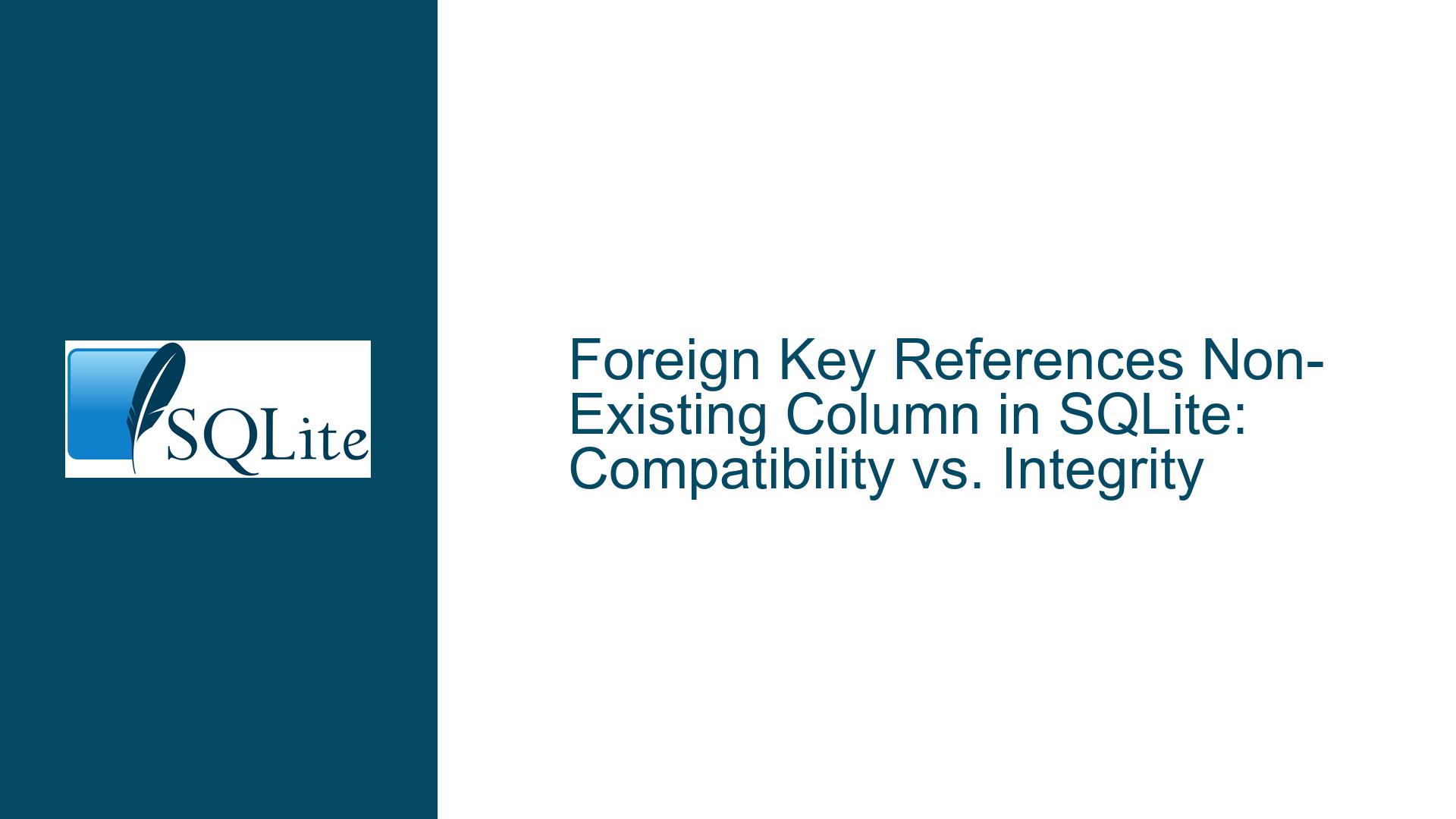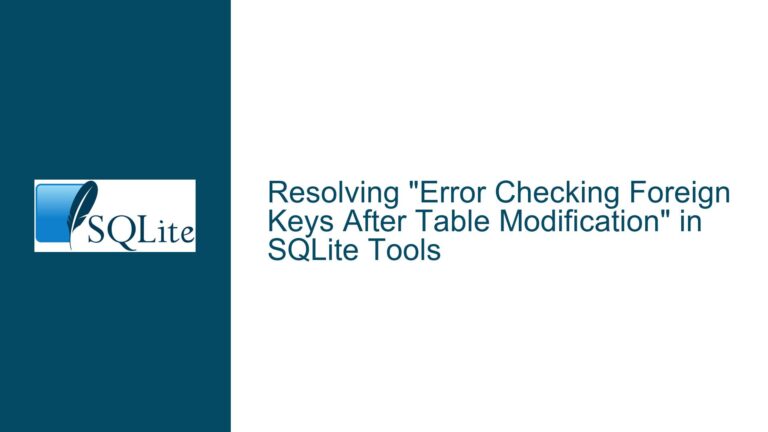Foreign Key References Non-Existing Column in SQLite: Compatibility vs. Integrity
Foreign Key Constraints Allowing Non-Existing Column References
In SQLite, foreign key constraints are designed to enforce referential integrity between tables. However, a peculiar behavior has been observed where a foreign key constraint can reference a column that does not exist in the parent table. This behavior is not a bug but a deliberate design choice rooted in SQLite’s commitment to backward compatibility. When a foreign key references a non-existing column, SQLite does not raise an error or enforce the constraint at the time of table creation. This behavior can be confusing for developers who expect immediate validation of foreign key references.
The issue arises when a table is created with a foreign key constraint that references a column in another table, but the referenced column does not exist. For example, consider the following SQL script:
PRAGMA foreign_keys = ON;
CREATE TABLE a (a_id PRIMARY KEY);
CREATE TABLE b (b_id PRIMARY KEY, a_id REFERENCES a(non_existing_id));
In this script, table b is created with a foreign key constraint that references a column named non_existing_id in table a. However, table a does not have a column named non_existing_id. Despite this, SQLite allows the creation of table b without any errors or warnings. This behavior is contrary to the expectation that SQLite should enforce referential integrity at the time of table creation.
The documentation for SQLite explicitly states that the parent key in a foreign key constraint must be a named column or columns in the parent table. However, the observed behavior suggests that SQLite does not enforce this rule strictly. This discrepancy between the documented behavior and the actual behavior can lead to confusion and potential issues in database design and maintenance.
Backward Compatibility and Future Column Additions
The primary reason for this behavior is SQLite’s commitment to backward compatibility. SQLite has been in use since 2004, and there are billions of databases in circulation that may have foreign key references to columns that do not yet exist. Enforcing strict validation of foreign key references at the time of table creation could break many legacy applications that rely on this behavior. Therefore, SQLite allows foreign key constraints to reference non-existing columns to maintain compatibility with older databases.
Another perspective on this behavior is that SQLite is anticipating future changes to the database schema. For example, a foreign key constraint that references a non-existing column could be seen as a placeholder for a future ALTER TABLE ... ADD COLUMN ... statement that will create the referenced column. This approach allows developers to define foreign key constraints before the referenced columns are created, providing flexibility in schema design.
However, this behavior can also lead to potential issues. If a foreign key constraint references a non-existing column, and the column is never created, the constraint will remain unenforced. This can result in data integrity issues if the application relies on the foreign key constraint to enforce referential integrity. Additionally, this behavior can make it difficult to detect and correct schema design errors, as the absence of errors or warnings at the time of table creation can mask the issue.
Enforcing Foreign Key Integrity with PRAGMA and Schema Validation
To address the issue of foreign key constraints referencing non-existing columns, developers can take several steps to ensure referential integrity in their SQLite databases. One approach is to use the PRAGMA foreign_key_check command to validate foreign key constraints after table creation. This command checks all foreign key constraints in the database and reports any violations, including references to non-existing columns.
For example, after creating tables a and b as shown in the previous script, the following command can be used to check for foreign key violations:
PRAGMA foreign_key_check;
If the foreign key constraint in table b references a non-existing column in table a, the PRAGMA foreign_key_check command will report the violation. This allows developers to identify and correct schema design errors before they lead to data integrity issues.
Another approach is to use schema validation tools or scripts to ensure that all foreign key constraints reference existing columns. These tools can be integrated into the database deployment process to automatically validate the schema before it is deployed to production. For example, a script could be written to query the sqlite_master table and check that all foreign key constraints reference existing columns in the parent table.
In addition to these approaches, developers can also use the PRAGMA journal_mode command to enable write-ahead logging (WAL) mode, which can help prevent database corruption in the event of a power failure or other unexpected shutdown. WAL mode provides better concurrency and performance compared to the default rollback journal mode, and it can also help ensure that foreign key constraints are enforced correctly.
Finally, developers should be aware of the potential risks associated with foreign key constraints that reference non-existing columns and take steps to mitigate these risks. This includes carefully reviewing the database schema design, using schema validation tools, and regularly checking for foreign key violations using the PRAGMA foreign_key_check command. By taking these steps, developers can ensure that their SQLite databases maintain referential integrity and avoid potential issues caused by foreign key constraints referencing non-existing columns.
Conclusion
The behavior of SQLite allowing foreign key constraints to reference non-existing columns is a deliberate design choice rooted in the need for backward compatibility and flexibility in schema design. While this behavior can be useful in certain scenarios, it can also lead to potential issues if not managed carefully. Developers should be aware of this behavior and take steps to ensure that foreign key constraints are properly enforced and validated. By using tools such as PRAGMA foreign_key_check and schema validation scripts, developers can maintain referential integrity in their SQLite databases and avoid potential issues caused by foreign key constraints referencing non-existing columns.






